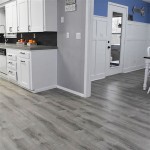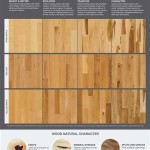Hardest Natural Wood Flooring: A Comprehensive Guide
The selection of appropriate flooring is a critical decision in both residential and commercial construction. Natural wood flooring offers a blend of aesthetic appeal, durability, and sustainability. However, not all wood species are created equal in terms of hardness and resistance to wear and tear. Understanding the Janka hardness scale and the properties of various wood species is essential for choosing the hardest and most durable natural wood flooring option.
The Janka hardness test measures the force required to embed a steel ball with a diameter of 0.444 inches (11.28 mm) to half its diameter into the wood. The resulting measurement, expressed in pounds-force (lbf), provides a quantitative measure of the wood's resistance to denting and scratching. A higher Janka rating indicates a harder wood, signifying greater resistance to abrasion and impact. While Janka hardness is a useful metric, it is important to note that it is just one factor to consider when selecting wood flooring. Other factors, such as grain pattern, stability, and finishing techniques, also play a significant role in the overall performance and longevity of the floor.
Several factors influence the perceived hardness and durability of wood flooring beyond its Janka rating. Wood density, measured in pounds per cubic foot (lbs/ft³), is closely related to hardness. Denser woods tend to be harder and more resistant to wear. Grain pattern also affects durability. Woods with tight, interlocked grain patterns generally exhibit greater resistance to splitting and warping. Furthermore, the finishing process significantly impacts the floor's overall performance. Durable finishes, such as polyurethane or aluminum oxide, provide a protective layer that shields the wood from scratches, stains, and moisture damage.
Understanding the Janka Hardness Scale
The Janka hardness scale is the industry standard for rating the relative hardness of different wood species. It provides a valuable benchmark for comparing the resistance of various woods to indentation and wear. The scale ranges from the softest woods, such as Balsa, to the hardest woods, such as Brazilian Walnut (Ipe). It is imperative to remember that the Janka hardness test is conducted under controlled laboratory conditions, and the actual performance of wood flooring in a real-world environment can be affected by factors such as humidity, traffic patterns, and maintenance practices.
For residential applications, a Janka hardness rating of 1000 or higher is typically recommended for areas with moderate to heavy foot traffic. For commercial applications, where foot traffic is generally higher and more demanding, a Janka rating of 1200 or higher is often preferred. However, it is important to consider the specific needs and conditions of the space when making a final decision. For instance, in areas prone to spills and moisture, a wood species with inherent water resistance or a durable finish may be more suitable, regardless of its Janka rating.
It is also important to note that the Janka hardness rating is not the sole determinant of a wood floor's overall durability and longevity. Other factors, such as proper installation, regular maintenance, and the use of appropriate cleaning products, are equally important in ensuring the floor's long-term performance. A well-maintained floor made from a moderately hard wood can often outperform a poorly maintained floor made from a very hard wood.
Top Hardest Natural Wood Flooring Options
Several wood species are known for their exceptional hardness and durability, making them ideal choices for high-traffic areas and demanding applications. These species typically have high Janka ratings and dense grain patterns, contributing to their resistance to denting, scratching, and wear. Some of the most popular and widely available hardest natural wood flooring options include:
Brazilian Walnut (Ipe): Often considered the gold standard for hardness and durability, Ipe boasts an impressive Janka hardness rating of approximately 3680. Its exceptional density and tight grain make it highly resistant to scratches, dents, and moisture. Ipe's rich, dark brown color and natural luster add to its aesthetic appeal. It is commonly used in both residential and commercial settings, including high-traffic areas and outdoor decking.
Cumaru (Brazilian Teak): Cumaru is another exceptionally hard and durable wood species from South America, with a Janka hardness rating of around 3540. It is known for its remarkable resistance to insects, decay, and moisture. Cumaru exhibits a variegated color palette, ranging from golden brown to reddish-brown, providing visual interest and character. It is a popular choice for flooring, decking, and other demanding applications.
Brazilian Cherry (Jatoba): Brazilian Cherry is a popular and readily available hardwood with a Janka hardness rating of approximately 2350. It features a distinctive reddish-brown color that deepens over time with exposure to light. Brazilian Cherry is known for its stability, durability, and resistance to insect infestation. It is commonly used in residential and commercial flooring applications, adding warmth and elegance to any space.
Hickory: Native to North America, Hickory is a dense and durable hardwood with a Janka hardness rating of around 1820. It is known for its exceptional strength, shock resistance, and distinctive grain patterns. Hickory flooring offers a natural, rustic aesthetic, adding warmth and character to any room. It is often used in high-traffic areas, such as kitchens and living rooms.
Hard Maple: Hard Maple is a widely available and versatile hardwood with a Janka hardness rating of approximately 1450. It is known for its smooth, uniform grain and light color, which makes it an excellent choice for modern and contemporary designs. Hard Maple is also relatively stable and resistant to wear, making it suitable for a variety of flooring applications. While not as hard as Ipe or Cumaru, it offers a good balance of durability, aesthetics, and affordability.
Besides these widely available options, other less common but exceptionally hard woods exist. These include several exotic hardwoods primarily sourced from Central and South America, often with Janka ratings exceeding 3000. However, these woods may be more difficult to source, more expensive, and potentially less sustainable, requiring careful consideration of ethical sourcing practices.
Factors Beyond Hardness to Consider
While Janka hardness is a crucial factor in selecting natural wood flooring, other factors must also be considered to ensure a satisfactory outcome. These factors include dimensional stability, moisture resistance, finishing options, and maintenance requirements. Ignoring these aspects can lead to premature wear, warping, or other problems, regardless of the wood's initial hardness.
Dimensional Stability: Wood is a hygroscopic material, meaning it absorbs and releases moisture from the surrounding environment. This moisture exchange can cause wood to expand and contract, leading to gaps, cupping, or warping. Wood species with high dimensional stability are less prone to these problems, making them more suitable for environments with fluctuating humidity levels. Woods like Teak and engineered wood flooring tend to exhibit excellent dimensional stability.
Moisture Resistance: In areas prone to spills, moisture, or high humidity, choosing a wood species with inherent moisture resistance is essential. Some woods, such as Ipe and Cumaru, contain natural oils and resins that make them naturally resistant to water damage. However, even moisture-resistant woods should be properly sealed and maintained to prevent water penetration and staining.
Finishing Options: The finish applied to wood flooring plays a crucial role in protecting the wood from scratches, stains, and moisture. Durable finishes, such as polyurethane and aluminum oxide, provide a hard, protective layer that extends the life of the floor. Different finishes also offer varying levels of sheen, affecting the overall aesthetic of the floor. Consider the desired look and level of maintenance when selecting a finish.
Maintenance Requirements: All wood flooring requires regular maintenance to keep it looking its best. This includes sweeping or vacuuming regularly to remove dirt and debris, as well as occasional mopping with a pH-neutral cleaner. The frequency and type of maintenance required will depend on the type of wood, the finish, and the level of traffic. Understanding the maintenance requirements of different wood species is essential for making an informed decision.
In conclusion, selecting the hardest natural wood flooring involves considering multiple factors, with Janka hardness as a primary but not exclusive metric. Considering wood density, grain pattern, dimensional stability, moisture resistance, finishing options, and maintenance requirements is crucial to achieving a durable and aesthetically pleasing floor that meets the specific needs of the space. Researching different wood species and consulting with flooring professionals can help ensure a successful and long-lasting flooring investment.

1 2 X 7 Talon Semi Gloss Engineered Natural Hickory Hardwood Cabinets To Go

What Is The Hardest Wood Flooring Ambience Hardwood

Bellawood 3 4 In Natural Hickory Solid Hardwood Flooring 25 Wide Ll

Best Engineered Hardwood Floor For Scratch Resistance Lifecore Flooring S

Bellawood 3 4 In Natural Hickory Solid Hardwood Flooring Wide Ll

The Hardest Hardwood Floors Are They Worth It

Colorful Hardest Ipe Solid Wood Flooring China Hardwood Made In Com

Cumaru Roja Solid Prefinished Natural Planet Hardwood

Types Of Hardwood Floors The Home Depot

The 26 Best Hardwood Species For Flooring Floorings
Related Posts








